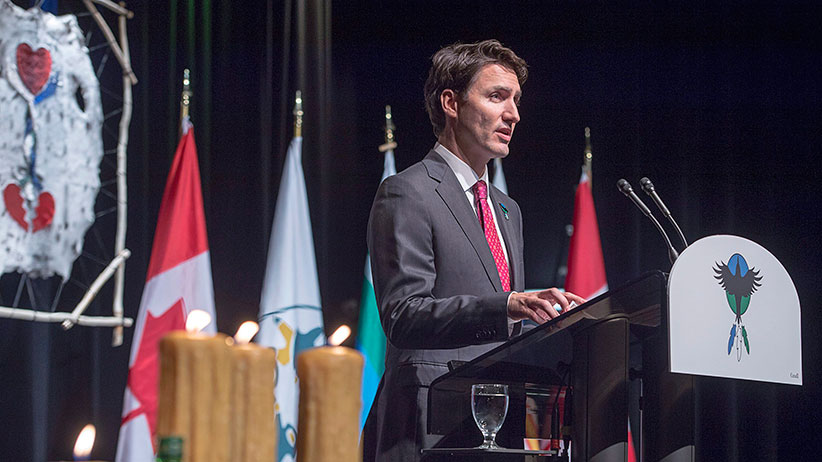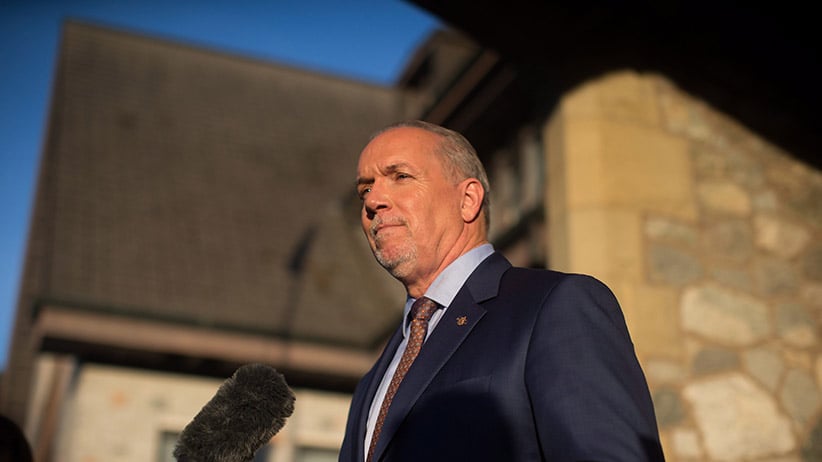Politicians need to learn how to show, not tell
From Justin Trudeau to John Horgan, Canadian politicians are failing to take action to back up their talk, writes Andray Domise
Prime Minister Justin Trudeau delivers an apology on behalf of the Government of Canada to former students of the Newfoundland and Labrador Residential Schools in Happy Valley-Goose Bay, N.L. on Friday, Nov. 24, 2017. (Andrew Vaughan/CP)
Share

Last summer, I sat in the office of Michael Coteau, Ontario’s Minister of Children and Youth Services, and I was frustrated beyond belief. Coteau had earlier been deputized by the Ontario Liberal government as the minister responsible for the Anti-Racism Directorate, and I requested the appointment to share my concerns over the way systemic racism was playing out in the nonprofit sector.
At the time, I was not only having difficulty finding financial support for the nonprofit organization I helped found to support youth of colour in tech, but I’d become something of an outlet for the anxieties of other founders of colour. Regardless of our goals, the shortfalls in government support were always the same: too much funding was being concentrated in the hands of massive nonprofits, and not enough was being allocated for small, local startups that focused on communities of colour.
Coteau and I discussed these shortfalls, and his assistant eagerly took notes. I recommended to other nonprofit founders that they communicate with Minister Coteau’s office, and as far as I’m aware, his staff was not only active in reaching out and consulting with local organizations, but they held multiple community consultations to find new ways of supporting the ones they hadn’t reached individually. Earlier this year, Minister Coteau announced the Ontario Black Youth Action Plan, which included a $47-million budget aimed at supporting more than 10,000 Black children and closing the systemic gaps that continually leave them disadvantaged. Many of the recommendations in the plan included ones that were suggested during the several consultations held by Coteau’s office.
While the Ontario Black Youth Action Plan is by no means a comprehensive fix (as noted by my colleague Melayna Williams), I bring this up because there’s something important about Coteau’s approach that should be noted as the 2018 election season draws close. When Coteau was named head of the Anti-Racism Directorate, he avoided making grand pronouncements, and avoided patting himself on the back for simply listening to the frustrations that have boiled over in the community for decades. When he announced the plan, he announced it with a budget, a strategic plan, and a concrete end goal.
In other words, he didn’t just tell. He showed his work.
Last week, a collective of Black Canadians from across the country convened at the Toronto Reference Library to attend the National Black Canadian Summit, hosted by former Governor General Michaëlle Jean. There were several speakers at the summit, including Ontario Court Justice Donald McLeod and Halifax city councillor Lindell Smith. But John Tory also made an appearance, proudly touting Toronto City Council’s action plan to confront anti-Black racism.
The $1-million Action Plan is noteworthy on its own merit (if rather paltry, compared to projects like the proposed $1.6-billion park situated above Union Station’s rail decks). But there was something rather inauspicious about Tory, standing in a room full of Black Canadians, touting a plan to combat the forces he’d been called on from the moment he donned the Mayor’s chain, and had since shamefully failed to confront. There’s no million-dollar plan capable of wiping away the tarnish that Tory brought on himself when he continuously punted on the carding issue, until forced to capitulate in the face of massive protest action led by Black Lives Matter Toronto. In fact, more than a year since he agreed to a public and open discussion with Black Lives Matter, no such meeting has taken place.
There’s no announcement or promise that Tory can make that would cause the community to forget when the Toronto Police Services Board (upon which Tory serves as a member) adjourned their July meeting and walked out on Desmond Cole. Cole made headlines at that meeting when he engaged in peaceful protest, got arrested, and walked away from his Toronto Star column in order to force the Board’s conversation on the alleged police assault against Dafonte Miller. It took Tory a shamefully long time to even address anti-Black racism as a problem in Toronto, and by the time he announced it, he had already become a symbol.

John Tory is far from the only politician in this country who could use a lesson in showing, not telling. On Dec. 10, British Columbia Premier John Horgan announced his government would move forward with the controversial Site C hydroelectric dam. The project will flood thousands of hectares along the Peace River valley, displace local farmers, submerge Indigenous burial grounds, and wipe out fishing in the area for at least a generation. In his announcement, Horgan detailed the financial downsides of cancelling the project, and put on a very earnest face as he declared, “I am not the first person to stand before you and disappoint Indigenous people.”
MORE: Why approving Site C is the B.C. NDP’s first serious political blunder
Prime Minister Justin Trudeau and the federal Liberal government have also had numerous challenges in living up to expectations from marginalized communities. The inquiry into missing and murdered Indigenous women has failed Indigenous families, all but collapsing into a bureaucratic quagmire, with calls for the resignation of its chief commissioner, Marion Buller. As Maclean’s has reported, that failure stems at least in part from the government’s desire to produce a quick result in time for the next election. Marijuana decriminalization also looks as if it will not only fail communities that have been severely impacted by overpolicing and disparate prosecution, but will enrich the politically and law enforcement-connected at the expense of those communities.
At a time when voters are becoming more polarized, more skeptical, and more hopeless, fragile promises and empty gestures won’t cut it. There is nothing progressive or applause-worthy about apologizing to communities in the same breath as announcements that promise to do them further harm. Championing half-measures to address decades of systemic racism, and reworking laws into decorative filigrees to pin on the lapels of the rich and well-connected, aren’t going to bring voters back to the polling stations.
By no means is Minister Coteau a paragon. After all, he still has plenty of work cut out for him in addressing and undoing the harm done by the province’s Children’s Aid Societies. But at the very least, he had the backbone to stand before Black communities, absorb the criticism non-defensively, promise to do better, and then make good on that promise.
As we draw closer to the next round of elections, his peers ought to be the ones taking notes.